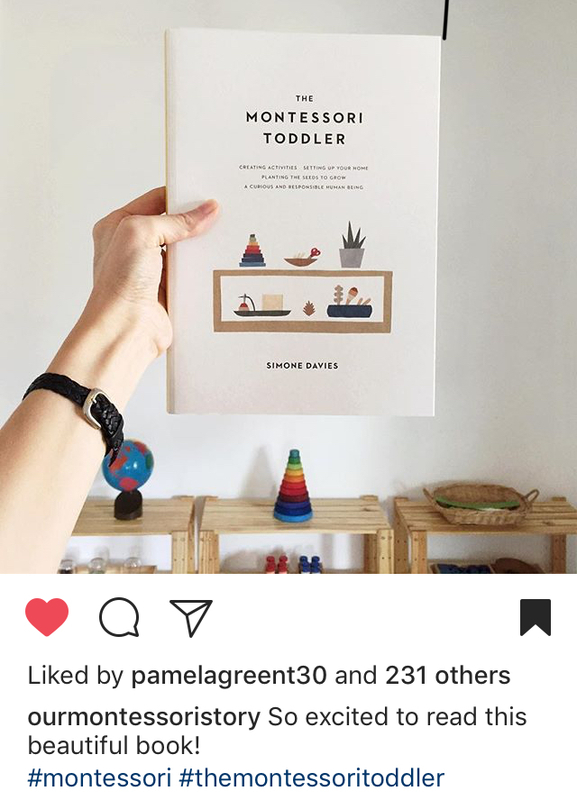How not to stop a tantrum. Yes, you read that right.
Firstly a huge thank you to everyone who responded to the recent tour of our Montessori toddler classroom here. And to everyone who has been receiving their copies of The Montessori Toddler book and sharing them. The excitement has been infectious. So fun to be part of a revolution to help people see toddlers in a new way. So many pictures have been coming in – I love this one on Instagram by @ourmontessoristory – her shelf nearly looks like the cover of the book.

Now onto today’s inspiration…how not to stop a tantrum. Yes, you read that right.
How not to stop a tantrum
For those of you who have been reading my blog for a while, you know that when a child is having a hard time, I like to acknowledge their feelings. Let them know I understand.
Instead of denying their feelings (“Don’t worry about it,”) or getting into long explanations, we could simply say, “You really wanted to make juice right now and all the juice is gone. Are you finding that hard?”
They feel heard. And often that is even enough for them to calm down.
But what if they won’t stop.
I had a parent in class tell me about her child having a hard time. They told me that they had been acknowledging the child’s feelings but the child was still upset and wouldn’t calm down.
We don’t acknowledge their feelings just to make them stop. We acknowledge their feelings to say:
- I am a safe person you can express anything with
- I love you even when you are having a hard time
- I don’t care what other people think when you are having a hard time. I’ll be here to hold and support you until you calm down.
- Don’t hold onto those negative feelings. Process them. Get them out. However long it takes.
So the uncomfortable news is we need to get comfortable with them expressing their ugly feelings. Allowing them to let it out. Completely.
What we don’t need to do
- We don’t need to give them a big lecture.
- We don’t need to shame them.
- We don’t need to hold a grudge about it for the rest of the day.
- We don’t need to take it personally or get embarrassed.
- We don’t need to solve the problem for them – they are learning that things don’t always go their way.
What we can do
When a child is having a hard time, I don’t get angry or tell that “that’s enough now!”
- I tell them, “It’s hard to see you having a hard time.” [I might have used this recently with one of my teenagers!]
- I am their rock, their calm guide. I stay calm so that I can support them, rather than getting angry or emotional myself.
- When we try to calm them down and fix things, it takes a lot of energy. I simply hold space for them, and let them know I am there if they need any help.
- I offer to cuddle them. Some will want to be cuddled. Others will push us away, and we can stay close and keep them safe, “I’m here if you need me.”
- When they are calm, they often let out a big sigh. This is a moment to connect with them. “Was that hard for you?”
- Then once they are calm, I can help them to make amends if needed – tidy up a mess, check if the other child is ok, wipe up a spill etc.
After a big tantrum, you’ll often find that the toddler will jump back up and be their happy selves again. They don’t hold grudges or stay in a bad mood all day. By leaning in and processing these big emotions, they can move on.
It’s part of why I think toddlers are so brilliant. I even think it is an honour for a toddler to have a meltdown with you. You are a safe person who will love them even when they are having a hard time.
So next time they have a hard time, maybe we’ll even say “thank you for trusting me with this.”
For more about dealing with tantrums including a handy infographic, click here.
I hope this gives you some food for thought. Do you try to manage your child’s feelings so they stop crying? Maybe next time let them lean into these feelings and release them completely. Interestingly, in my yoga class last week, the teacher was talking about allowing feelings out like a young child. As adults, we are being reminded that we don’t have to push away all negative feelings. We can observe them, learn from them, and let them move on.
I hope you all have a lovely week. Personally I’m looking forward to the week ahead with sunny skies and cold temperatures – would be perfect skiing weather…but for the lack of mountains here!
I’ll be back soon with more Montessori inspiration for you. I get a lot of questions about daily rhythms with young children so you are going to want to see what we have coming up next time. Til then…
Warmest wishes,
Simone

Simone Davies has more than 20 years’ experience as an AMI Montessori educator. Simone is the author of “The Montessori Toddler” and co-author of “The Montessori Baby” and “The Montessori Child” books, comprehensive guides to raising children in a Montessori way. She currently runs parent-child Montessori classes in Amsterdam at her school Jacaranda Tree Montessori. She also has a popular blog, instagram and podcast “The Montessori Notebook” and is mother to two young adults.